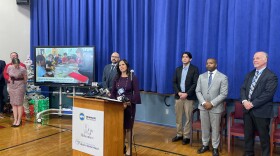The American Society of Civil Engineers (ASCE) released its 2021 Report Card For America’s Infrastructure, and Wisconsin received a C — one of the best overall infrastructure scores.
Since 1998, this report is issued every four years and highlights the challenges facing the United States' outdated and underfunded infrastructure. From roads and airports to drinking water and stormwater, 17 categories are graded for each state and the nation overall.
For the first time in 20 years, the United States is out of the D range and received a C-. However, most of the county’s infrastructure is than 50 years old, and a pandemic and severe weather has only put more strain to our systems.

Wisconsin scored high grades on solid waste and energy, while getting D+’s on roads and transit. Darren Olson is the vice chair of the committee on American’s infrastructure with ASCE and says Wisconsin faces an ever-growing backlog of projects when it comes to roads.
“In Wisconsin, you have an estimated $13 billion shortfall within the next decade in roadway improvements and funding for those improvements, so there’s a lot to do and just a very large maintenance backlog,” he says.
Olson says the area that needs the most work, not only in Wisconsin but across the country, is transit.
“The transit backlog in this country is staggering, it’s in the almost $200 billion of transit backlog and 45% of Americans don’t have access to public transit, so that was the lowest grade,” he says.
When it comes to updating and creating new infrastructure, Olson says it can’t just be about clearing out backlogs but also making sure that it can handle new challenges — like climate change and more severe weather events.
“As we invest in our infrastructure, we need to do that in a way to make sure that it is going to be resilient for not just what we’re seeing right now, but for situations that are even more extreme than that, that they’re predicting that we’re going to see in the next, you know, 25 to 50 years,” he says.

That investment is not only going to help protect the infrastructure but, according to Olson, that money could help reduce the effects of the COVID-19 pandemic on the economy.
“Every $1 that we spend on infrastructure brings back $2.20 in economic benefit, so there’s really no better way to get ourselves out of this recession other than investment through infrastructure,” he says.
Olson warns without that investment, any part of the country is vulnerable to see massive failures like that in Texas after historic winter storms hit the state.
“Our infrastructure bill is long overdue at this point, we’ve been underfunding it for a very long period of time and especially when looking at things like climate change, we need to step up and pay this bill now,” he says.







